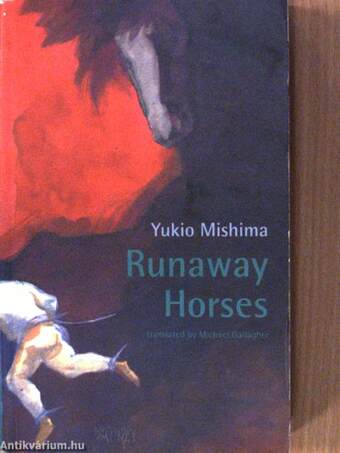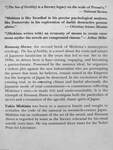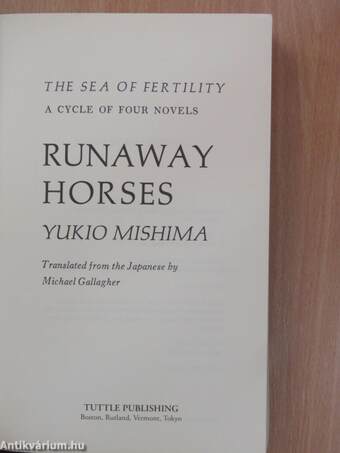1.067.297
kiadvánnyal nyújtjuk Magyarország legnagyobb antikvár könyv-kínálatát

VISSZA
A TETEJÉRE
JAVASLATOKÉszre-
vételek
Runaway Horses
| Kiadó: | Tuttle Publishing |
|---|---|
| Kiadás helye: | North Clarendon |
| Kiadás éve: | |
| Kötés típusa: | Ragasztott papírkötés |
| Oldalszám: | 421 oldal |
| Sorozatcím: | The Sea of Fertility |
| Kötetszám: | |
| Nyelv: | Angol |
| Méret: | 20 cm x 13 cm |
| ISBN: | 4-8053-0354-9 |
naponta értesítjük a beérkező friss
kiadványokról
naponta értesítjük a beérkező friss
kiadványokról
Fülszöveg
"[The Sea of Fertility] is a literary legacy on the scale of Proust's."
— National Review
"Mishima is like Stendhal in his precise psychological analyses,
like Dostoevsky in his exploration of darkly destructive person-
alities." — Christian Science Monitor
"[Mishima writes with] an economy of means to create enor-
mous myths—his novels are compressed visions."— Arthur Miller
Runaway Horses, the second book of Mishima's masterpiece
tetralogy, The Sea of Fertility9 is a novel about the roots and nature
of Japanese fanaticism in the years that led to war. Set in the
1930s, its driven hero is Isao—young, engaging, and becoming
a patriot-fanatic. Possessed by the samurai ideal, he organizes
a violent plot against the new industrialists who are preempting
the power that must, he believes, remain vested in the Emperor
lest the integrity of Japan be destroyed. In the excitement of the
ensuing trial, in its stunning climax and fateful aftermath, the
Japanese mode of total... Tovább
Fülszöveg
"[The Sea of Fertility] is a literary legacy on the scale of Proust's."
— National Review
"Mishima is like Stendhal in his precise psychological analyses,
like Dostoevsky in his exploration of darkly destructive person-
alities." — Christian Science Monitor
"[Mishima writes with] an economy of means to create enor-
mous myths—his novels are compressed visions."— Arthur Miller
Runaway Horses, the second book of Mishima's masterpiece
tetralogy, The Sea of Fertility9 is a novel about the roots and nature
of Japanese fanaticism in the years that led to war. Set in the
1930s, its driven hero is Isao—young, engaging, and becoming
a patriot-fanatic. Possessed by the samurai ideal, he organizes
a violent plot against the new industrialists who are preempting
the power that must, he believes, remain vested in the Emperor
lest the integrity of Japan be destroyed. In the excitement of the
ensuing trial, in its stunning climax and fateful aftermath, the
Japanese mode of total commitment—a commitment reflecting
Mishima's own—is made felt and understandable. It is the
triumph of Runatvay Horses to encompass both the particulars of
an era and a resonance of the age-old, classic spirit of Japan.
Yukio Mishima was born to a samurai family and sought to
revitalize the code of the samurai in twentieth-century Japan.
Mishima was an enthusiast of the art of the sword, and Runaway
Horses is regarded by some as the literary rehearsal for his ritual
suicide years later. He was nominated three times for the Nobel
Prize for Literature. Vissza
Témakörök
- Idegennyelv > Idegennyelvű könyvek > Angol > Szépirodalom > Regény, novella, elbeszélés
- Szépirodalom > Regény, novella, elbeszélés > Az író származása szerint > Ázsia > Japán
- Szépirodalom > Regény, novella, elbeszélés > Tartalom szerint > Lélektani regények
- Szépirodalom > Regény, novella, elbeszélés > Tartalom szerint > Történelmi regények > Legújabb kor > Egyéb
- Szépirodalom > Regény, novella, elbeszélés > Tartalom szerint > Földrajzi besorolások > Ázsia
- Szépirodalom > Regény, novella, elbeszélés > Irodalmi díjas szerzők > Nobel-díjasok
Yukio Mishima
Yukio Mishima műveinek az Antikvarium.hu-n kapható vagy előjegyezhető listáját itt tekintheti meg: Yukio Mishima könyvek, művekMegvásárolható példányok
Nincs megvásárolható példány
A könyv összes megrendelhető példánya elfogyott. Ha kívánja, előjegyezheti a könyvet, és amint a könyv egy újabb példánya elérhető lesz, értesítjük.






